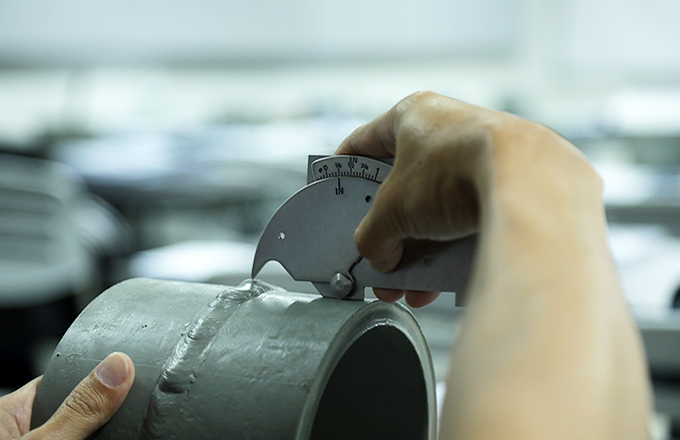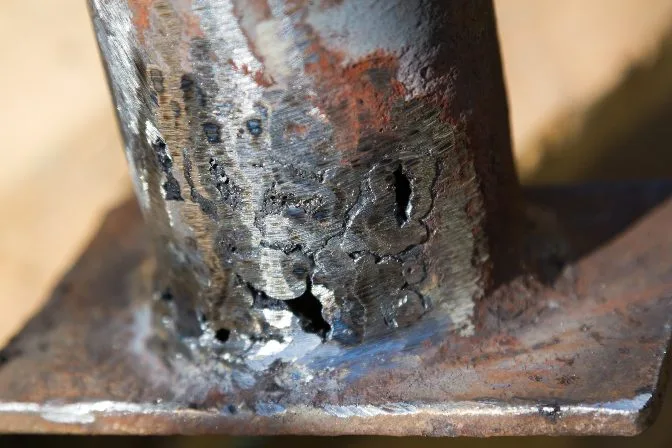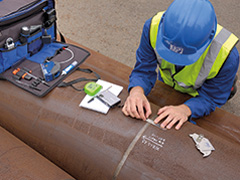Checking Out Advanced Devices and Methods for Accurate Welding Examination
In the world of welding inspection, the pursuit of accuracy and integrity is vital, stimulating the advancement of sophisticated devices and approaches. Technologies such as phased selection ultrasonic screening and digital radiography are changing issue discovery, using unequaled accuracy in defining welding problems. Additionally, laser scanning innovations and automated inspection systems, furnished with fabricated knowledge, are redefining the landscape by lowering human mistake and boosting security measures. As these sophisticated methods remain to develop, they guarantee not just to change assessment techniques but also to elevate interesting questions concerning the future of high quality assurance in industrial applications.
Ultrasonic Testing Technologies
Ultrasonic screening innovations regularly represent the leading edge of innovations in welding evaluation innovations. These technologies have actually significantly enhanced the capacity to detect and evaluate interruptions within bonded structures, making certain improved honesty and safety.

Furthermore, innovations in software application formulas for information evaluation have actually boosted the accuracy of issue discovery and sizing. Automated ultrasonic testing systems currently offer high-resolution imaging, making it possible for comprehensive assessments of weld top quality. These systems are commonly incorporated with advanced visualization devices, which facilitate the interpretation of results.
Radiographic Assessment Techniques
While ultrasonic testing technologies have actually set a high criterion in non-destructive examination, radiographic examination strategies remain to play an essential function in welding inspection by providing one-of-a-kind understandings into product honesty. Radiographic screening (RT) uses the usage of X-rays or gamma rays to permeate products, developing a radiograph that aesthetically represents the interior framework of a weld. This imaging capability is important for identifying subsurface defects such as porosity, inclusions, and fractures that might not show up via surface area evaluations.
The process includes putting a radiation resource on one side of the weld and a detector on the contrary side. Variants in product thickness and thickness influence the depletion of the rays, generating a contrasting image that exactly defines problems. RT is specifically advantageous for inspecting thick sections and complicated geometries where other approaches may fail.
In spite of its performance, radiographic evaluation should be conducted with strict adherence to security procedures as a result of the unsafe nature of ionizing radiation. Furthermore, the interpretation of radiographs requires competent personnel, as the top quality of the evaluation straight impacts the integrity of the inspection. Continuous innovations in digital radiography are enhancing picture clarity and analysis efficiency, reinforcing RT's critical function in ensuring weld high quality.
Laser Scanning Breakthroughs
Embracing laser scanning innovation in welding assessment has reinvented the analysis of weld top quality and integrity. Unlike standard assessment methods, laser scanning supplies fast information procurement, considerably enhancing the performance and accuracy of weld analyses.
Laser scanning Visit Website advances have actually caused significant renovations in defining and discovering surface defects such as porosity, lack of combination, and undercuts. The high-resolution data makes it possible for assessors to execute detailed analyses, guaranteeing that welds satisfy strict industry criteria. This technique sustains the advancement of electronic documents, helping with long-lasting high quality guarantee and traceability.
Additionally, laser scanning modern technology integrates flawlessly with software program remedies designed for automated problem detection and assessment. The resultant data can be quickly shared and assessed, promoting collective decision-making procedures. As industries proceed to demand greater standards for weld top quality, laser scanning stays at the leading edge, providing exceptional accuracy and effectiveness in welding assessment.
Automated Evaluation Equipments

Automated inspection systems offer the benefit of consistency, getting rid of human mistake and subjectivity from the inspection process. They are made to run in different environments, from production floorings to remote field websites, guaranteeing extensive insurance coverage. Welding Inspection Madison. These systems can be set to comply with specific welding criteria and requirements, providing in-depth reports and documents for quality assurance purposes
Furthermore, the integration of cloud-based systems facilitates the storage and analysis of substantial amounts of inspection data. This enables pattern evaluation and predictive upkeep, enabling producers to attend to potential problems prior to they intensify. The adoption of automatic evaluation systems is a crucial step towards improving the integrity and efficiency of welding procedures in industrial applications.

Enhancing Safety And Security and Efficiency
A substantial aspect of enhancing security and effectiveness in welding examination depends on the integration of innovative innovations that enhance procedures and alleviate threats. The Home Page fostering of innovative non-destructive screening (NDT) techniques, such as ultrasonic screening, phased range ultrasonic testing (PAUT), and radiographic screening, plays an essential duty in guaranteeing structural integrity without compromising the safety of the workers involved. These techniques permit extensive assessments with very little downtime, decreasing potential risks related to conventional approaches.
In addition, the execution of real-time information analytics and artificial intelligence algorithms has actually transformed the method evaluation data is interpreted. By utilizing predictive analytics, possible issues can be determined before they show up right into essential failings, guaranteeing prompt treatments and upkeep. This proactive strategy dramatically improves functional efficiency and safety and security in welding processes.
Moreover, remote inspection innovations, consisting of drones and robot crawlers equipped with high-resolution video cameras, make it possible for examiners to assess hard-to-reach areas without revealing them to unsafe problems. This not just boosts evaluation precision yet likewise lessens human threat. By leveraging these sophisticated tools and techniques, industries can accomplish greater security criteria and functional performance, ultimately leading try this site to more dependable and sustainable welding examination techniques.
Verdict
The integration of sophisticated devices and methods in welding evaluation considerably boosts issue detection and makes sure structural integrity. Welding Inspection Madison. Developments such as phased variety ultrasonic testing, digital radiography, and laser scanning enhance issue characterization, while automated inspection systems and AI reduce human mistake. Remote technologies help with safe assessments in hazardous settings, advertising a proactive upkeep strategy. These advancements not only enhance evaluation efficiency however likewise add to enhanced security and high quality assurance in industrial welding applications.

Ultrasonic screening advancements frequently represent the forefront of improvements in welding assessment innovations.While ultrasonic screening developments have actually set a high criterion in non-destructive assessment, radiographic examination techniques proceed to play an integral role in welding inspection by supplying one-of-a-kind insights right into material integrity.Accepting laser scanning innovation in welding inspection has actually transformed the assessment of weld high quality and integrity. As industries proceed to require greater standards for weld top quality, laser scanning continues to be at the center, providing exceptional precision and performance in welding examination.
Automated assessment systems provide the benefit of uniformity, removing human error and subjectivity from the inspection procedure.